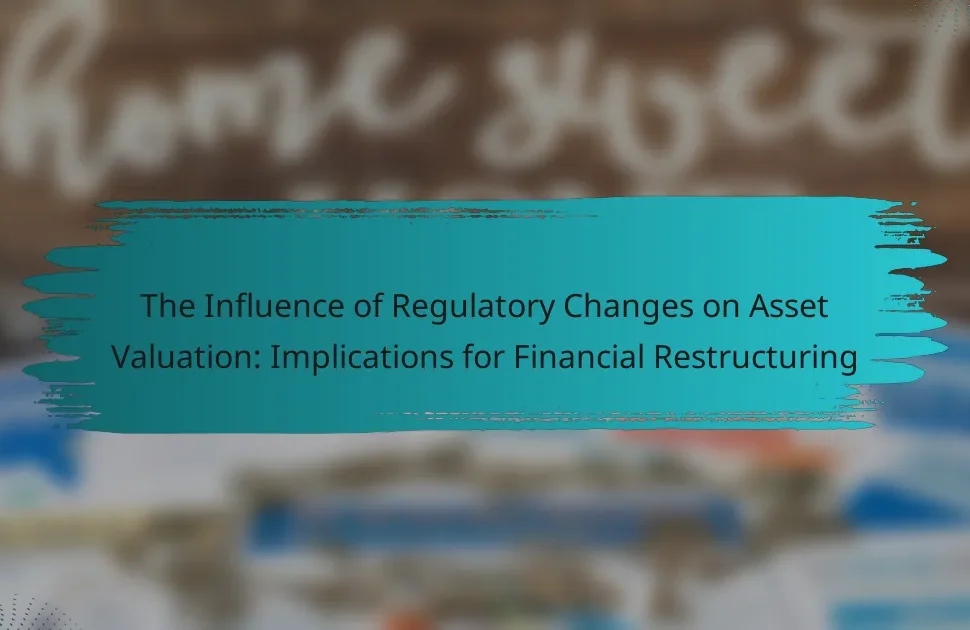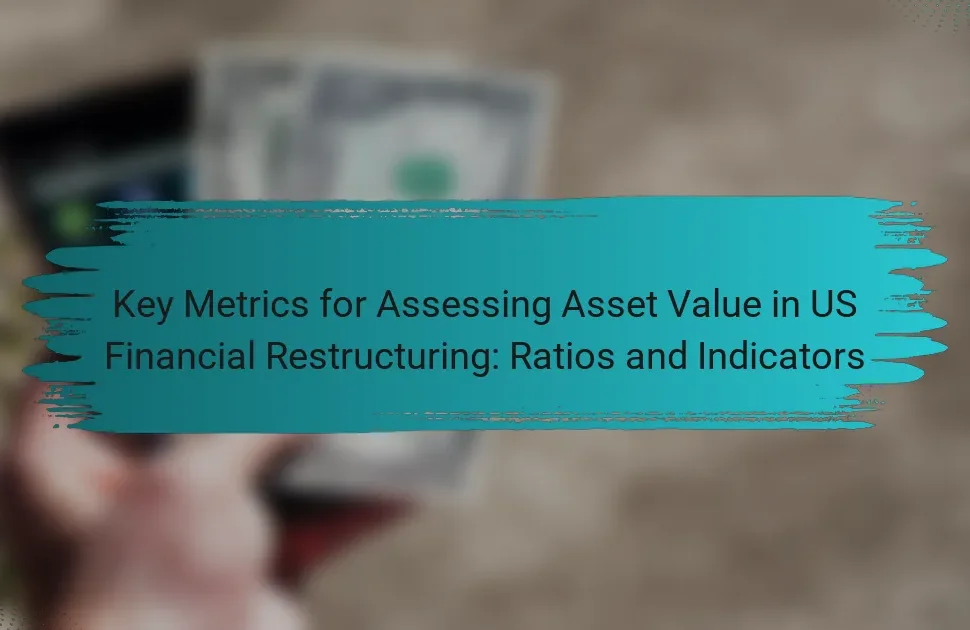Economic conditions are a critical factor influencing asset valuation, impacting prices through various mechanisms such as demand, investor confidence, and interest rates. During periods of economic growth, asset prices generally rise, while downturns lead to declines in value due to reduced demand and increased risk aversion. Key elements affecting asset valuation include interest rates, inflation, and shifts in consumer behavior, with historical examples illustrating the relationship between economic health and asset prices. Current trends indicate that rising interest rates and inflationary pressures are reshaping the asset valuation landscape, prompting investors to seek alternative investments. Understanding these dynamics is essential for making informed investment decisions.

What is the Impact of Economic Conditions on Asset Valuation?
Economic conditions significantly influence asset valuation. Economic growth typically leads to higher asset prices due to increased demand and investor confidence. Conversely, economic downturns can decrease asset values as demand wanes and risk aversion rises. Interest rates also play a crucial role; lower rates reduce the cost of borrowing, encouraging investment and increasing asset prices. Inflation affects real asset values, as rising prices often diminish purchasing power. Market conditions, such as unemployment rates and consumer spending, further impact valuations. Historical data shows that during the 2008 financial crisis, asset values plummeted due to adverse economic conditions. This illustrates the direct correlation between economic health and asset valuation.
How do economic conditions influence asset valuation?
Economic conditions significantly influence asset valuation through various factors. Changes in interest rates affect the cost of borrowing and the discount rates applied to future cash flows. Higher interest rates typically lead to lower asset valuations as the present value of future earnings decreases. Inflation impacts purchasing power and can erode the real returns on investments, thereby affecting valuations negatively. Economic growth rates indicate the potential for future earnings, influencing investor confidence and asset demand. Additionally, market sentiment, driven by economic indicators, can lead to fluctuations in asset prices. For instance, during economic downturns, assets often see reduced valuations due to decreased consumer spending and business investment. Historical data shows that during the 2008 financial crisis, asset prices plummeted as economic conditions worsened, highlighting the direct relationship between economic health and asset valuation.
What are the key economic indicators affecting asset valuation?
Key economic indicators affecting asset valuation include interest rates, inflation rates, GDP growth, and unemployment rates. Interest rates influence borrowing costs and investment returns. Higher interest rates typically lower asset prices as borrowing becomes more expensive. Inflation rates affect purchasing power and can erode future cash flows from assets. GDP growth indicates economic health and can lead to higher corporate earnings, positively impacting asset values. Unemployment rates reflect labor market conditions and consumer spending power, influencing overall demand for goods and services. These indicators are essential for investors to assess market conditions and make informed decisions.
How do changes in interest rates impact asset valuation?
Changes in interest rates directly affect asset valuation. When interest rates rise, the cost of borrowing increases. This leads to lower demand for loans and investment. Consequently, future cash flows from assets are discounted at a higher rate. This results in lower present values for those cash flows. Conversely, when interest rates fall, borrowing becomes cheaper. This stimulates demand for loans and investment. Future cash flows are discounted at a lower rate, increasing their present value. Historical data shows that a 1% increase in interest rates can reduce stock prices by approximately 10%. This demonstrates the significant impact of interest rate fluctuations on asset valuation.
Why is understanding asset valuation important in economic analysis?
Understanding asset valuation is crucial in economic analysis because it provides a basis for investment decisions. Accurate asset valuation reflects the true worth of investments. This helps investors assess risks and returns effectively. Economic conditions directly influence asset values. For instance, during economic downturns, asset values typically decline. Conversely, in a thriving economy, asset values tend to increase. Understanding these dynamics aids in forecasting market trends. It also supports policy-making by indicating economic health. Therefore, asset valuation is integral for informed economic assessments.
What role does asset valuation play in investment decisions?
Asset valuation is crucial in investment decisions as it determines the worth of an asset. Investors rely on accurate valuations to assess potential returns. A well-valued asset can indicate whether to buy, hold, or sell. Valuation methods include discounted cash flow and comparative analysis. These methods provide insights into an asset’s future performance. For example, a study by Damodaran (2020) highlights that overvalued assets often lead to poor investment outcomes. Thus, precise asset valuation helps mitigate risks and enhances decision-making.
How can asset valuation affect market stability?
Asset valuation directly influences market stability by determining the perceived worth of financial assets. Accurate valuations lead to informed investment decisions. When asset values are inflated, it can create market bubbles, increasing volatility. Conversely, undervalued assets can lead to market corrections, causing instability. Historical examples, such as the 2008 financial crisis, illustrate how misvalued assets can trigger widespread economic disruption. In that crisis, overvaluation of mortgage-backed securities led to significant market instability. Thus, precise asset valuation is crucial for maintaining balanced and stable markets.

What are the current trends in economic conditions affecting asset valuation?
Current trends in economic conditions affecting asset valuation include rising interest rates, inflationary pressures, and shifts in consumer behavior. Rising interest rates increase the cost of borrowing. This can lead to lower asset prices, particularly in real estate and equities. Inflation affects purchasing power and can erode real returns on investments. This often results in investors seeking inflation hedges, such as commodities or real assets. Additionally, shifts in consumer behavior, driven by technological advancements and changing preferences, impact the valuation of companies. For instance, sectors like e-commerce have seen increased valuations due to heightened demand. Overall, these economic conditions are reshaping the landscape of asset valuation significantly.
How are global economic trends influencing asset valuation?
Global economic trends significantly influence asset valuation. Changes in interest rates affect the cost of borrowing. Lower interest rates typically increase asset values by making financing cheaper. Conversely, higher rates can decrease valuations due to increased borrowing costs. Economic growth influences demand for assets. Strong growth often leads to higher valuations, while recessions can depress them. Inflation trends also play a role. Rising inflation can erode purchasing power, impacting asset values negatively. Currency fluctuations affect international asset valuations. A stronger currency can make foreign assets more expensive, reducing their attractiveness. Overall, these trends create a dynamic environment for asset valuation.
What impact do geopolitical events have on asset valuation?
Geopolitical events significantly impact asset valuation. These events can cause fluctuations in market confidence and investor sentiment. For instance, political instability often leads to increased risk perception. This perception can result in lower asset prices as investors seek safer investments. Historical data shows that during events like the Arab Spring, stock markets in affected regions experienced sharp declines. Additionally, sanctions imposed on countries can restrict trade and reduce economic growth, further impacting asset values. Overall, the relationship between geopolitical events and asset valuation is direct and measurable.
How do technological advancements shape asset valuation trends?
Technological advancements significantly influence asset valuation trends by enhancing data analysis capabilities. These advancements allow for more accurate forecasting and modeling of asset values. Improved algorithms analyze vast datasets quickly. This leads to better risk assessment and investment strategies. Real-time data access enables timely decision-making in asset management. Technologies like artificial intelligence and machine learning identify patterns that traditional methods may miss. According to a report by McKinsey, firms leveraging advanced analytics can boost their performance by up to 20%. Thus, technological innovations directly correlate with evolving asset valuation methodologies.
What are the historical trends in economic conditions and asset valuation?
Historical trends in economic conditions show a significant correlation with asset valuation. Economic growth typically leads to higher asset prices. For example, during the post-World War II boom, asset values surged due to increased consumer spending and investment. Conversely, recessions often result in declining asset prices. The 2008 financial crisis exemplified this, with housing market values plummeting. Inflation also affects asset valuation; high inflation can erode purchasing power, impacting stock and bond prices. Interest rates are another critical factor; lower rates generally boost asset valuations by making borrowing cheaper. Historical data indicates that as interest rates fell in the 2010s, stock markets experienced substantial growth. Overall, economic conditions shape investor sentiment, directly influencing asset valuations over time.
How have past economic recessions influenced asset valuation?
Past economic recessions have significantly influenced asset valuation by causing sharp declines in market prices. During recessions, investor confidence typically diminishes, leading to reduced demand for assets. This drop in demand results in lower asset prices across various markets, including real estate and equities. For instance, the 2008 financial crisis led to a 30% decline in U.S. housing prices. Similarly, stock markets experienced substantial downturns, with the S&P 500 losing about 57% of its value from peak to trough. Recessions often trigger increased risk aversion among investors, prompting them to sell off assets. This selling pressure exacerbates price declines, further impacting valuations. Additionally, economic contractions can lead to tighter credit conditions, making it more difficult for investors to finance asset purchases. Historical data consistently shows that asset valuations tend to recover slowly post-recession, reflecting long-term shifts in investor sentiment and market fundamentals.
What patterns can be observed in asset valuation during economic booms?
Asset valuation typically increases during economic booms. This rise is driven by higher consumer spending and business investments. Increased demand for goods and services boosts corporate earnings. As profits rise, investor confidence strengthens, leading to higher stock prices. Real estate values often appreciate due to increased demand for housing. Additionally, lower unemployment rates contribute to higher disposable income. This financial stability encourages investment in various asset classes. Historical data from the 1990s dot-com boom shows significant asset price inflation. During this period, the S&P 500 index rose dramatically, illustrating the correlation between economic growth and asset valuation.

What insights can be drawn from the relationship between economic conditions and asset valuation?
Economic conditions significantly influence asset valuation. During economic growth, asset prices typically increase due to higher demand and investor confidence. Conversely, during recessions, asset values often decline as demand decreases and uncertainty rises. Interest rates are a critical factor; lower rates generally boost asset prices by making borrowing cheaper. Inflation also affects valuations; moderate inflation can enhance asset values, while hyperinflation can erode them. Historical data shows that in the 2008 financial crisis, asset prices plummeted due to economic instability. In contrast, the post-pandemic recovery saw a surge in asset prices as economic conditions improved. Understanding these dynamics helps investors make informed decisions.
How can investors leverage economic insights for asset valuation?
Investors can leverage economic insights for asset valuation by analyzing macroeconomic indicators. These indicators include GDP growth, inflation rates, and unemployment figures. They provide context on market conditions and consumer behavior. For instance, a rising GDP often signals robust economic health, suggesting higher asset values. Conversely, high inflation can erode purchasing power, affecting asset prices negatively.
By using these insights, investors can adjust their valuation models accordingly. They can apply discounted cash flow analysis that incorporates expected economic conditions. Historical data shows that assets tend to perform better during economic expansions. Research from the National Bureau of Economic Research indicates that economic cycles significantly impact asset returns. Thus, understanding these cycles is crucial for accurate asset valuation.
What strategies can be employed to assess asset valuation during economic fluctuations?
Employing multiple strategies is essential to assess asset valuation during economic fluctuations. One effective strategy is to conduct comparative analysis using historical data. This involves comparing current asset prices to historical performance during similar economic conditions. Another strategy is to utilize discounted cash flow (DCF) analysis. DCF accounts for future cash flows and adjusts for risk factors related to economic changes.
Market sentiment analysis can also be beneficial. This strategy assesses investor behavior and market trends to gauge asset value. Additionally, scenario analysis helps in understanding potential future states of the economy and their impact on asset prices.
Stress testing is another strategy that evaluates how assets perform under extreme economic conditions. It provides insights into potential vulnerabilities. Lastly, employing expert opinions and market research reports can offer qualitative insights into asset valuation trends.
These strategies collectively enhance the accuracy of asset valuation assessments during economic fluctuations.
How can economic forecasts aid in predicting asset valuation trends?
Economic forecasts can significantly aid in predicting asset valuation trends by providing insights into future economic conditions. These forecasts analyze indicators such as GDP growth, inflation rates, and unemployment figures. For instance, a forecast predicting economic growth may suggest rising asset values due to increased consumer spending. Conversely, forecasts indicating a recession could lead to declining asset values. Historical data shows that asset prices often correlate with economic indicators. For example, during the 2008 financial crisis, economic forecasts predicted downturns, leading to a drop in asset prices. Thus, economic forecasts serve as essential tools for investors to anticipate and react to market changes.
What are best practices for evaluating asset valuation in changing economic conditions?
Best practices for evaluating asset valuation in changing economic conditions include conducting regular market analysis. This involves assessing current economic indicators such as interest rates and inflation. Understanding the impact of these indicators on asset prices is crucial. Utilizing discounted cash flow (DCF) analysis helps in estimating the present value of future cash flows. Adjusting valuation models to reflect changing market conditions is essential. Incorporating scenario analysis can provide insights into various economic outcomes. Engaging with industry experts offers additional perspectives on market trends. Lastly, maintaining flexibility in valuation approaches allows for timely adjustments as conditions evolve.
How can diversification mitigate risks in asset valuation?
Diversification mitigates risks in asset valuation by spreading investments across various assets. This strategy reduces exposure to any single asset’s poor performance. For example, if one asset class declines, others may remain stable or appreciate. Historical data shows that diversified portfolios tend to have lower volatility. According to a study by Markowitz (1952), diversification can optimize returns while minimizing risks. Therefore, including a mix of asset types can enhance overall portfolio stability.
What tools and resources are available for asset valuation assessment?
Asset valuation assessment can be conducted using various tools and resources. Common tools include financial modeling software, such as Excel, which allows for detailed calculations. Online valuation calculators provide quick estimates based on input data. Industry-specific databases, like Bloomberg or S&P Capital IQ, offer comprehensive financial information. Professional valuation services employ certified appraisers for accurate assessments. Additionally, educational resources, including valuation textbooks and online courses, enhance understanding of valuation methods. These tools collectively support informed decision-making in asset valuation.
The main entity of this article is the impact of economic conditions on asset valuation. It examines how factors such as interest rates, inflation, and economic growth influence asset prices and investor behavior. Key economic indicators are identified, highlighting their role in assessing market conditions and making informed investment decisions. The article also explores historical trends, current market dynamics, and strategies for evaluating asset valuation during economic fluctuations, emphasizing the importance of accurate assessments for market stability and investment success.




